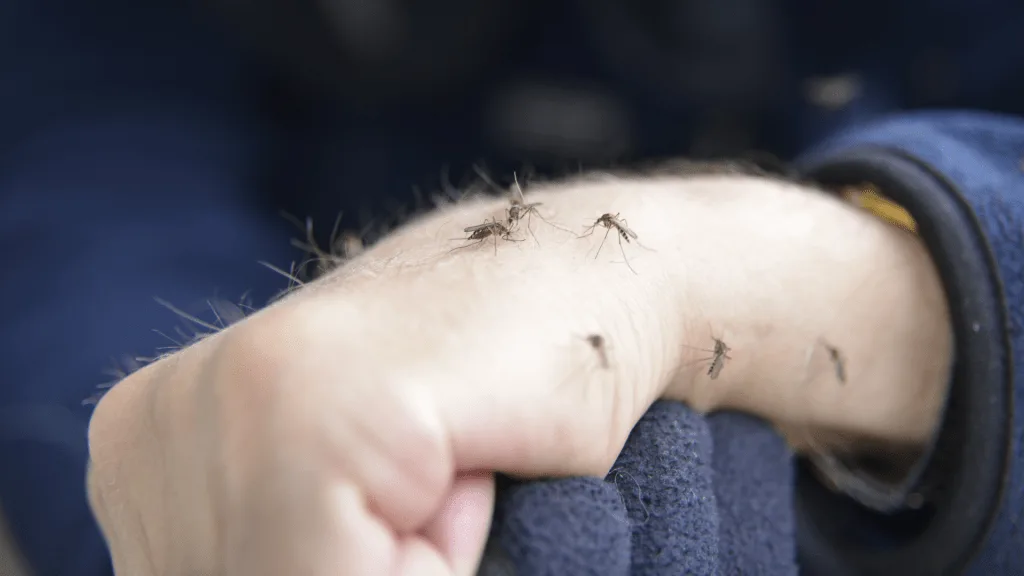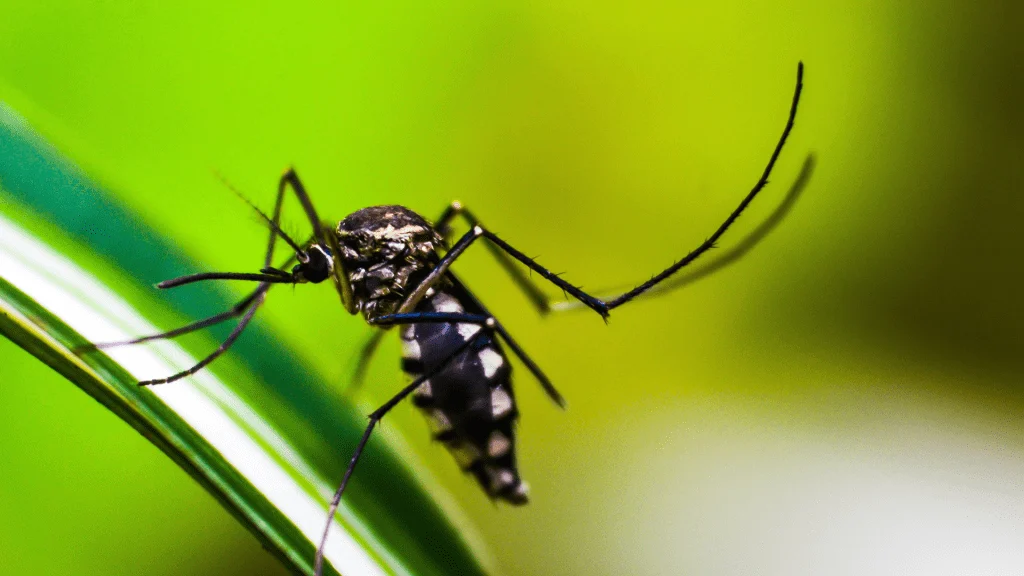If you’re one of the few people that mosquitoes don’t bite, consider yourself lucky. Whether it’s an itchy, swollen welt, or dengue fever, these bites are no fun.
But most mosquito repellents don’t smell great; you must carefully apply them safely. So how can you keep these pests from munching on you without the chemicals?
We have some lesser-known remedies to share with you.
Let’s fly!
What Are 3 Types of Mosquitoes in the USA?
Out of almost 200 mosquito species in America, the top three make up most of those you’ll encounter. Coming in first is the Anopheles genera. And their favorite snacks are humans and other mammals.
They’re active from dusk ’til dawn and don’t care whether you are inside or out.
Anopheles mosquitoes carry malaria. On the other hand, Culex species have diseases like West Nile virus and Equine Encephalitis. Although they prefer to bite birds, they’ll go for it if they smell the human scent.
You’ll find Culex living in all parts of the U.S.
Our third most common U.S. species is Aedes aegypti. Once only found in tropical and subtropical areas, this critter is crafty and now lives worldwide. They still prefer a warm climate, so you probably won’t find them in Northern states like Michigan and Maine.
Aedes like to bite during the day and carry diseases like yellow fever and Zika virus. It sounds like we’re talking about a horror movie, right?
The odds are small that you’ll contract any of these illnesses. But it’s better to be safe than sorry.

Why Do Mosquitoes Bite?
It might surprise you that not all mosquitoes bite. Males mate, feed on plant nectar, and only live about ten days. But it’s the ladies that want our blood. And they live five times longer than their male counterparts. Females need blood protein to produce healthy eggs.
Not only that, but mosquitoes flock to some people more than others. They love things our skin excretes, like lactic acid, ammonia, and cholesterol. And they love carbon dioxide. Essentially, they’re attracted to every exhale humans and other animals make.
And it even gets more complicated than that. Some research states that Aedes prefer type-O blood. And some people remain mosquito targets for no apparent reason. So genetics may determine whether or not you get a bite.
Keep in mind that they can detect us from over 160 feet away. If you want to get ahead of the game, try not to sweat or move around a lot. And wear dull, neutral clothing since these pests are attracted to bright colors.
What Are Common Mosquito Repellents?
Most commercial mosquito repellents contain chemicals mixed with other ingredients for the sole purpose of repelling bugs. DEET is the active chemical ingredient in brands like OFF! and Cutter, and it’s one of the most effective insecticides around.
The problem is that it smells terrible, is oily, and can damage some fabrics. Not only that, but it’s drawn plenty of public health concerns over the years. However, the speculation has been discredited by health officials.
When used as advised, DEET is safe and effective.
Picaridin is another widely used insecticide and has barely any odor at all. Although it’s a manufactured chemical, it doesn’t cause skin irritation like DEET. In fact, many people buy products with picaridin or IR-3535 to avoid using DEET. Although IR-3535 doesn’t last quite as long, it works well and has been used for decades in Europe.
Pro Tip: We compared Essential Oil Versus Bug Spray: The Camper Real Test to decide which is the best way to keep bugs away!

5 Secret Natural Ways To Repel Mosquitoes
If you’re up for trying out some lesser-known ways to repel mosquitoes, you might want to try some of these options. You won’t hear about them as much as things like citronella, as far as natural alternatives are concerned. But it turns out citronella barely works anyway! Here are five better options:
#1 Burn Incense
Mosquitoes are picky little midges. They love biting us, but they hate things like wind and smoke. Especially fragrant smoke. So one way to keep them at bay is to burn an incense stick. Incense is made from plants and aromatic oils that release fragrant smoke when burnt.
Although there’s no science behind the claim, many say burning incense keeps mosquitoes away. It may help if you like keeping your window open on a hot summer night. Look for sticks containing eucalyptus, cloves, and pinion.
#2 Burn Coffee Grounds
Unlike our other secret weapons that turn mosquitoes away, coffee grounds work by getting rid of the larvae. These insects lay their eggs in water. And it only takes a little bit to make them happy. So getting rid of any standing water in your yard is the first step.
But mosquitoes also lay their eggs on moist dirt. So how can you stop them there? Just save up your used coffee dregs, dry them for a day, and sprinkle them on the earth!
A 2016 Miami New Times article states locals use burnt coffee grounds to rid their yards of mosquito eggs and larvae because female mosquitoes don’t like laying eggs on used grounds. Also, caffeine can inhibit larvae growth.
Miami locals swear by using Cuban coffee specifically. And if you’re a coffee lover, why not try it?
#3 Essential Oils
Essential oils are concentrated oils extracted from plants. They’re used for aromatherapy, soap scent, and particular traditional medicine. And some are very effective mosquito repellents.
According to the Environmental Protection Agency, lemon-eucalyptus is the most effective oil combination. Plenty of insect repellents contain it as a key ingredient. Geranium and peppermint oils have also been used on their own to get rid of bugs, albeit briefly.
And you’ve probably already heard that citronella oil works since the candles are marketed as a natural mosquito repellent. That said, it’s the least effective on this list.`

#4 Dryer Sheets
Whoever first discovered that dryer sheets repel insects must be proud. Who’d have thought throwing laundry sheets around could keep mosquitoes away? You’ll find mixed opinions on the subject if you look up forum opinions. But this might come down to the brand and not the tactic itself.
Some dryer sheets contain a fragrant ingredient called linalool, which bugs find repulsive. So your sheets may or may not work, depending on what kind you have. Bounce is a popular option for both indoor and outdoor bugs.
Although there’s no scientific research about dryer sheets with mosquitoes, they’ve been proven effective against fungus gnats. So why not try it? Especially since used sheets can still work. Just put a couple in your pockets to see if your brand works.
#5 Apple Cider Vinegar
Apple cider vinegar has a surprising number of benefits. It can help with weight loss, aid digestive issues, and lower blood sugar. It’s also great at killing bacteria and repelling bugs.
But you’ll have to do a bit more than drink it to get rid of mosquitoes.
If you’re okay with smelling a little sour, pour the vinegar into a spray bottle and spray it on your skin. And if all you have is white vinegar, just add it with equal parts water to your mister. Just keep in mind white vinegar may not work as well.
Pro Tip: Use these 5 solutions to Keep Those Dang Bugs Out Of Your RV.
What’s Best to Deter Mosquitoes: Natural Repellent or Insecticide?
Whether you use our secret natural mosquito repellants or the more common insecticides will depend on personal preference.
Try a natural remedy if the chemicals in store-brand bug sprays bother you. It can’t hurt, and you may find that a combination of alternatives suits your lifestyle best.
But if the idea of trial and error drives you nuts, just hold your nose and stick with DEET.
Discover the Best Free Camping Across the USA
To be honest with you, we hate paying for camping. There are so many free campsites in America (with complete privacy).
You should give it a try!
As a matter of fact, these free campsites are yours. Every time you pay federal taxes, you’re contributing to these lands.
Become a FREE CAMPING INSIDER and join the 100,000 campers who love to score the best site!
We’ll send you the 50 Best Free Campsites in the USA (one per state). Access the list by submitting your email below: